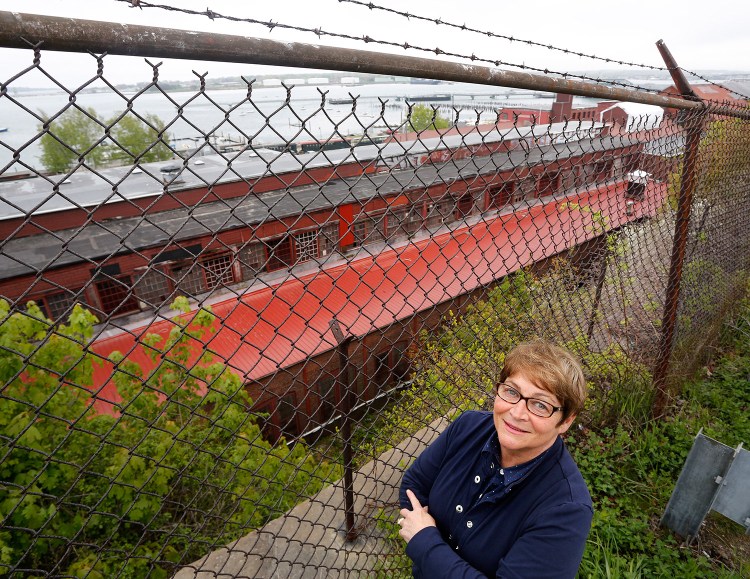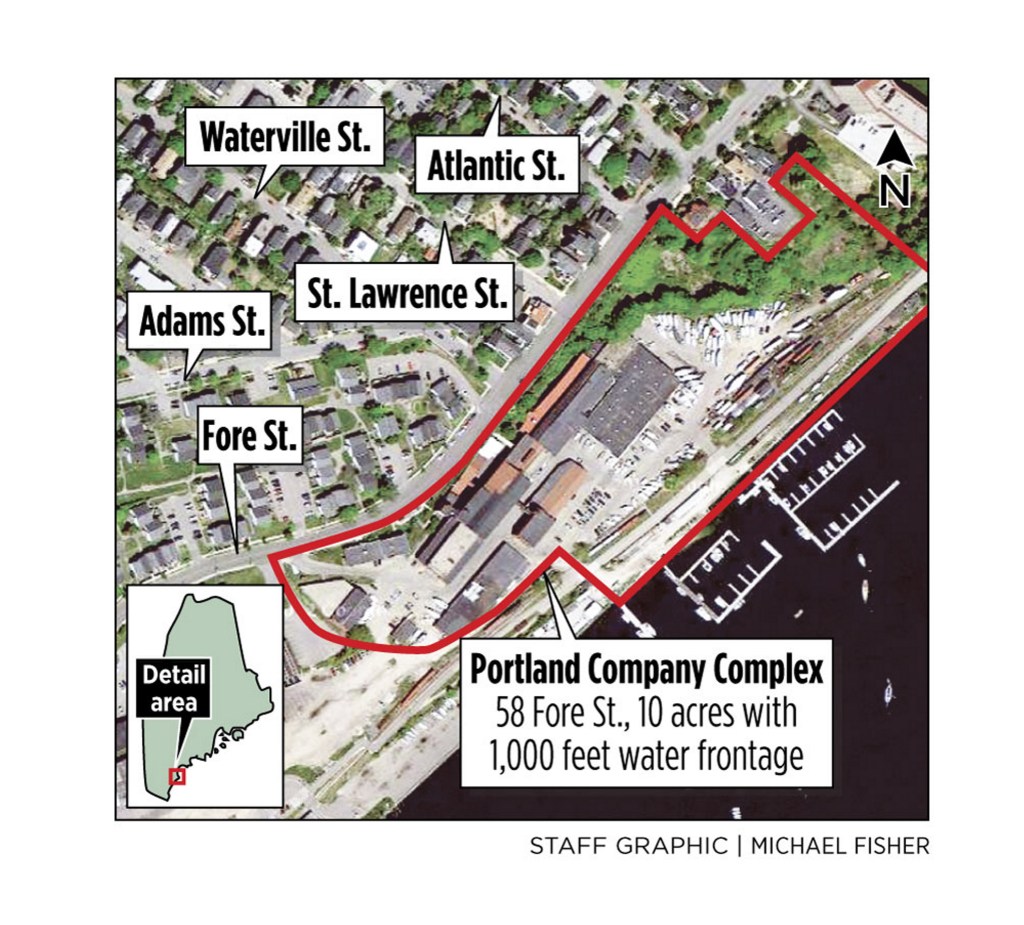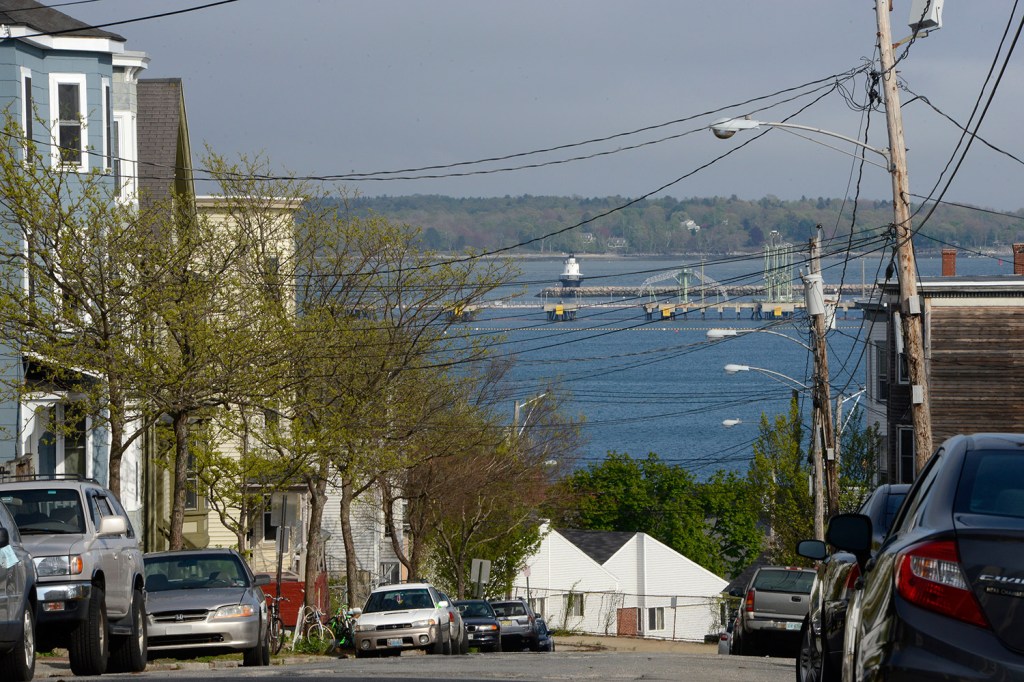A group of Portland residents is preparing to launch a citywide referendum campaign to protect scenic views in the city – starting with a 10-acre waterfront parcel that is slated for a major redevelopment.
The Soul of Portland group filed a signed affidavit with the city clerk’s office at 9:30 a.m. Tuesday. The city attorney has seven days to review the language of the proposed referendum. Once the language is approved, advocates can start collecting signatures on petitions.
If ultimately passed by Portland voters, the referendum would protect the views of Portland Harbor and Casco Bay from upper Fore Street and establish a Scenic Viewpoint Task Force to study other views that deserve protection. It also would change the planning process to require developers to submit detailed development plans when looking to rezone their properties.
The proposed referendum is in response to a request by a group of developers to rezone the former Portland Co. complex at 58 Fore St. to allow for taller buildings and a greater mix of uses, including residential.
The developers, CPB2, say the zone change is consistent with the city’s 2004 Eastern Waterfront Master Plan, but opponents say that plan sought to protect the views along upper Fore Street.
The zoning request is still pending before the council, which is expected to hold a public hearing and possibly vote on the proposal on June 1.
Anne Rand, a former state legislator who is the Soul of Portland’s spokeswoman, said that if the referendum passes in November, it would be retroactive to May 19, meaning it would effectively nullify any council approvals.
“We have other beautiful vistas that are at risk,” Rand said during an interview at City Hall Tuesday morning. One example she cited was the view of the Back Cove and White Mountains from along Sheridan Street, where two large-scale developments are being built into the hillside.
Jim Brady, co-manager of CPB2, said at a news conference at The Press Hotel – a historic rehabilitation project he recently oversaw — that a “small but vocal group” of opponents are discrediting the work of professional city planners, the Planning Board and the entire planning process.
Brady said it is too soon to tell whether the project will be delayed and, if so, how long the developers could afford to wait.
“Certainty is one of things that is really important with real estate development projects and having a cloud hanging over any approvals is certainly not a favorable idea,” Brady said.
The city already protects certain “view corridors,” including three corridors through the Portland company project that provide views of the harbor. However, the Soul of Portland’s proposal would create a Scenic Viewpoint Protection Overlay over the entire 10-acre parcel, preventing any buildings from disturbing the view.
The group said the proposed Scenic Viewpoint Task Force would rate other distinct views according to a scorecard used by the former State Planning Office in the 1990s to evaluate impacts of proposed wind developments. The group predicted that only a few vistas would qualify for protection and that scenic protections would not halt all development in the city.
The Soul of Portland appears to be taking a page from the play book of the Friends of Congress Square Park, which filed an affidavit last year for a referendum prior to a City Council vote. The friends group was successful at the polls and the council’s vote to sell the small park at Congress and High streets was nullified.
But there are also noticeable difference. The friends group was spurred by what they described as a back-door deal to sell a public space for private development without going through a robust public bidding process. Also, the group noted that a previous panel of citizens wanted to improve the park, not sell it for development.
The Eastern Waterfront, however, has long been envisioned for rezoning and redevelopment. Other properties abutting the Portland Co. have already been rezoned to allow for taller buildings — in some cases 65 feet, although there is a dispute about how new building heights should be measured. The Soul of Portland argues that building heights should be measured from the flood plain, which would ensure that no buildings would rise above Fore Street. The developer and the city, however, argue that the heights should be measured from average grade on the parcel, which would allow for buildings of up to 35-feet-tall to be built on Fore Street.
McManamy and Rand said the group decided to pursue a referendum because one-on-one meetings with councilors left them with the impression the zone change would be approved. However, they held out hope that councilors would “do the right thing.”
“If they meet our requirements, then we will not turn in the signatures,” McManamy said.
If the city attorney approves the referendum, the Soul of Portland will have 80 days to collect at least 1,500 valid signatures from registered Portland voters.
The Soul of Portland also released the results of a poll question about the Portland Co. development. Private polling is considered less reliable than public polling because only the results that are beneficial to the person or group commissioning poll tend to be released.
Respondents were told by the pollster that the development would “block the views of Portland Harbor for the public and the residents” and asked their opinion of the project. Forty-four percent of the 507 residents polled by Raleigh-based Public Policy Polling from April 19-21 said they strongly disagreed with the development, while an additional 19 percent said they somewhat disagreed. Thirty-two percent of respondents said they either somewhat or strongly favored it. The poll has a margin of error of +/- 4.3 percent.
Brady, who has been developing real estate in the Portland area for nearly 20 years, said the amount of organized opposition to real estate in the city is “unique” and threatens the Greater Portland economy.
“It’s not a positive signal of the economic future of the city of Portland,” said Brady.
Send questions/comments to the editors.







